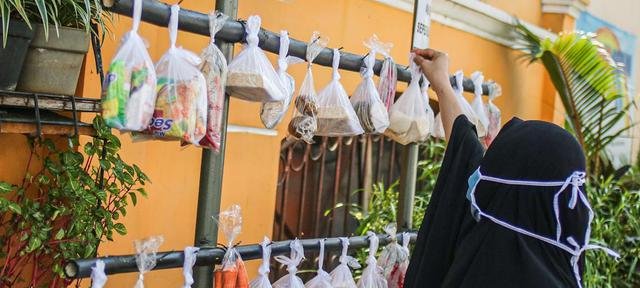Innovative response
JOGO TONGGO is the Javanese phrase for “look after your neighbour”. The program encourages residents of Central Java Province to return to traditional community support values and activities to ensure that everyone gets through the COVID-19 pandemic together. JOGO TONGGO encourages people to work together to guard each others’ health by not entering other people’s houses and ensuring distance is kept when meeting face-to-face, and by supporting each others’ financial resilience by sharing and bartering. The program is strongly supported by the Governor of Central Java.
Examples of activities implemented under the JOGO TONGGO program include the provision of items to grow your own food at home (seeds, compost, fish hatchlings); the creation of public kitchens where residents cook for each other and can eat for free; and the establishment of free food posts where residents can take and donate basic food items such as rice, tofu/tempe, fish, vegetables, fruit, and tubers.
Specific issues addressed and anticipated impact
It is hoped that JOGO TONGGO will lead to a social movement of support and solidarity, ultimately creating strong and resilient communities. Through it, both the health and the economy of the people are protected during the COVID-19 pandemic.
Organisations/institutions involved
Central Java Provincial and District/City Disaster Management Authorities
Governor of Central Java
Communities across Central Java
Potential issues
It is not easy to motivate and bring together a large part of Indonesia whose residents are from a variety of different backgrounds. Fortunately, the ideology of ‘gotong royong’ or communal help has long been a part of Central Java, so the principles of JOGO TONGGO are not new and are easily accepted.
The large number of residents of Central Java - around 30 million people - also means that fair and equal support requires serious attention and effort, meaning that some areas where local governments are less proactive may be left behind. At the end of July 2020, it was reported that only 30% of the provinces 7,809 villages were actively reporting their JOGO TONGGO activities.


